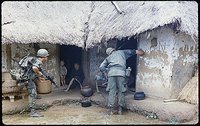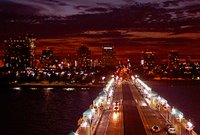
 Hugh Thompson, a vietnam war veteran and hero at My Lai, died this week. Trent Angers, Thompson's biographer and family friend, said Thompson died of cancer. Thompson is famous for his role in the My Lai Massacre.
Hugh Thompson, a vietnam war veteran and hero at My Lai, died this week. Trent Angers, Thompson's biographer and family friend, said Thompson died of cancer. Thompson is famous for his role in the My Lai Massacre.Early in the morning of March 16, 1968, Thompson, door-gunner Lawrence Colburn and crew chief Glenn Andreotta came upon U.S. ground troops killing Vietnamese civilians in and around the village of My Lai. "These people were looking at me for help and there was no way I could turn my back on them," Thompson recalled in a 1998 Associated Press interview.
They landed the helicopter in the line of fire between American troops and fleeing Vietnamese civilians and pointed their own guns at the U.S. soldiers to prevent more killings. Colburn and Andreotta had provided cover for Thompson as he went forward to confront the leader of the U.S. forces. Thompson later coaxed civilians out of a bunker so they could be evacuated, and then landed his helicopter again to pick up a wounded child they transported to a hospital.
Their efforts led to the cease-fire order at My Lai. In 1998, the Army honored the three men with the prestigious Soldier's Medal, the highest award for bravery not involving conflict with an enemy. It was a posthumous award for Andreotta, who had been killed in battle three weeks after My Lai. It was the ability to do the right thing even at the risk of their personal saf
 ety that guided these soldiers to do what they did," Army Maj. Gen. Michael Ackerman said at the 1998 ceremony. The three "set the standard for all soldiers to follow."
ety that guided these soldiers to do what they did," Army Maj. Gen. Michael Ackerman said at the 1998 ceremony. The three "set the standard for all soldiers to follow."Thompson was tormented by his role in the massacre - not only by the sheer brutality, but by the way that he was treated by his own countrymen. He was once told by a member of Congress that he should be the only one tried for the MY Lai Massacre.
Lt. William L. Calley, a platoon leader, was convicted and sentenced to life imprisonment for his role in the killings, but served just three years under house arrest when then-President Nixon reduced his sentence. Calley was the only soldier convicted.
The My Lai Massacre represents an ugly chapter in American and US Army history. Lt. Calley is often considered a scapegoat and there has never been a serious investigation into the chain of command on that bloody day.
The caviat in this tragedy is that many were rescued from certain death. Thanks to Hugh Thompson and his colleagues there are hundreds of innocent people who survived the massacre. This makes Thompson is a hero on many levels. He was not afraid to strike against convention and follow his conscience as a result he is indirectly responsible for the survival of two generations - those at the massacre and the children who were born later. His actions serve as an example to all soldiers and citizens.
You can hear Hugh Thomson tell this story in his own words at the Democracy Now website.





2 Comments:
There should be a monument for this guy. We need more soldiers like him. If more were willing to speak out then we not have problems like Abugrab.
Thanks for this post.
I've read the book Four Hours in My Lai by Michael Bilton and Kevin Sim.
There's a part where Thompson is sobbing - distressed and emotional - describing his experiences to his warrant officer named Charles Mansell. Thompson spoke of saving a child from a ditch filled with corpses. He said he'd seen at least 100 civilians slaughtered needlessly. Mansell had seen the bodies himself on a flyover. So what did the powers-that-be (the few men in charge who knew about this early on) decide to do? In an act of incredible folly, they handed it down to Col Henderson, Thompson's commander. Henderson did a poor job of probing - many say his investigation was intentionally vague for the fear of jeopardizing his own military advancement. To the day he died, Hugh Thompson swore that his signature was forged on documents that accompanied recommendations for Bronze medals for other soldiers.
Thompson got a Distinguished Flying Cross, and the writers of teh book claimed that the irony was "that Thompson and his crew were truly brave and noble soldiers - genuine heroes about whom America could justly feel proud if it had but known the truth."
Well - we know now. And Hugh Thompson was a great hero, a good soldier, and a decent man - and my prayers are with him and his family at this sad time.
Post a Comment
<< Home